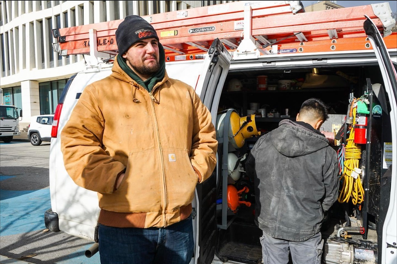This is a question that we often get from customers. It’s something that often confuses customers who are new to the technology of the heat pump. It wasn’t until fairly recently that heat pumps started to make a big impact in home comfort after many years as the standard for commercial buildings.
The terminology of heat pumps is a bit bewildering (they’re based on air conditioning technology and also deliver cooling). When people find out how they work, they’ll immediately have more questions, such as “Where is the heat pump getting this outdoor heat during the winter?”
The Background to the Question
Imagine you’re listening to an HVAC professional explain a heat pump to you for the first time. (In fact, this might be what is happening right now):
A heat pump is built similarly to an air conditioner: it uses refrigerant to move heat from one place to another. An air conditioner removes heat from inside a house, which creates cooler air, and it then releases this heat outdoors. A heat pump can do the same thing, but it can also work in reverse. When a heat pump switches into heating mode, it moves heat from outside the house and releases it into the house, warming up the air.
That seems like a simple enough explanation. But … wait a minute … the customer has a question of their own.
Since I’ll only use the heat pump in heating mode during cold weather, where is it getting heat? You told me it moves heat from outside to inside. But it’s cold outside! How is the heat pump able to remove enough heat from the air to warm up my house?
The Answer
Returning to our hypothetical dialogue between Technician and Customer:
No matter how cold it is outside, there’s always some amount of heat. “Cold” isn’t a type of energy, but the absence of energy—in this case, heat. Even the coldest air still has heat in it. The heat pump can access this heat energy as long as the refrigerant in the outdoor coil is colder than the air. When it’s colder, it will absorb heat through evaporation. Most heat pumps can work efficiently in cold temperatures down to freezing.
The customer has more to ask:
What happens if the temperature drops below freezing? Does the heat pump stop working?
The answer:
No, it will still be able to provide heat. But it will expend more energy to do so, causing a drop in the heat pump’s energy efficiency. However, there are special cold weather heat pumps that don’t suffer from this problem. They can work in below freezing temperatures without losing efficiency.
Should You Get a Heat Pump
We offer heat pump service in Rochester, NY and can answer any other questions you may have about these systems, including the big one: “Should I get a heat pump?” Heat pumps offer some terrific advantages, especially if you have an all-electric home. But they aren’t suitable for every home, and that’s why we recommend you consult with us before making a decision. We won’t steer you wrong.
Triple-O Heating, Cooling, Electrical & Plumbing Is Your One-stop Shop for HVAC, Plumbing and Electrical. Contact us today to schedule heat pump service.

